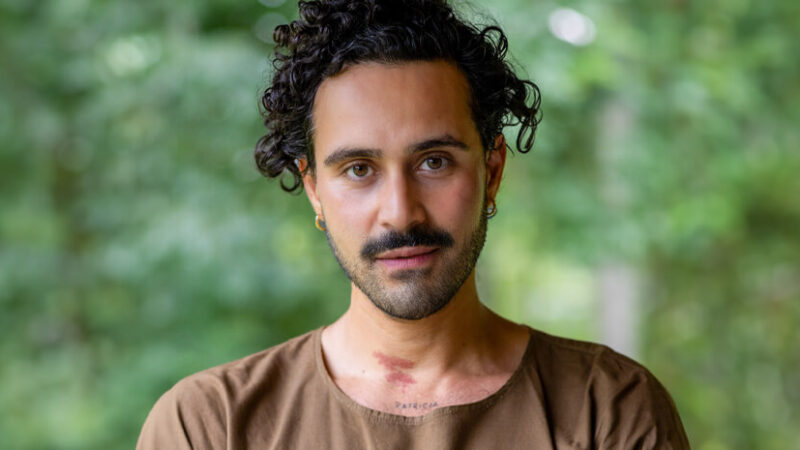Ursasana: Bear Posture
Many years ago, a bear sat down next to me while I was meditating in the woods. It was an afternoon in mid-October in the Berkshires, and I had been mountain biking in my favorite preserve. I took a break from riding to enjoy the perfect fall afternoon. I was overflowing with gratitude. My life was going well.
I sat under a strong oak tree and closed my eyes. I asked Spirit to come and sit with me, to share in my heartfelt thanksgiving. I spoke the words aloud and immediately heard footsteps in the woods behind me. They got closer, but I continued with my meditation, until directly behind me, I heard a twig snap and a loud exhalation through a very big nose. I knew in that moment, in every cell of my body, that a bear was behind me.
My heart pounded, and adrenaline surged through my body. I was totally alert and aware. I very slowly turned my head to look behind me and saw shining black fur from shoulder to rump, close enough to reach out and touch. It was a large black bear. Immediately my mind provided options for survival. Get up and run away? Get up and yell to scare the bear away? Climb a tree? Those ideas seemed bad. Sit still, do nothing, and breathe? Yes, that made sense. And so I did. I slowed my breathing and meditated on the intensity of my body’s response to this perceived threat.
In my yoga I had learned that strong sensations and emotions, including fear, can be powerful doorways into meditation. Rather than turning away from an uncomfortable experience, I had learned to breathe into what I was feeling. In this case, the fight-or-flight response was a huge wave washing over my mind, body, and soul. Instead of making a big story about what was happening, I remembered to face the experience in all of its raw power. I had the thought, This is the coolest thing that has ever happened to me! I had another thought, too: This might be the worst thing that has ever happened to me! Many hundreds of hours, I had practiced breathing through the intense sensations of yoga postures, watching my experience without reaction and allowing things to be the way they are. All that training on the mat was now being put to the test in a pose I had never tried before, Bear Pose, or Ursasana.
For a moment, I wondered how it might feel to be bitten by a bear. That was not a helpful thought, so I returned to my breathing. Moments seemed to stretch into hours. The bear walked out from behind the tree and sat next to me. It was smelling me. Still I remained motionless. In time, the bear walked away. I turned to look as it walked away. It turned to look back at me. Our eyes met, and then it disappeared down the hill. I stood up and fell down, my legs weak and wobbly. I stood again and got to my bike. I climbed on board and pedaled out of those woods like a bat out of hell!
For days, I was in a state of profound shock and elation. My life was filled with magic, possibility, and power. Anything could happen. I felt incredibly alive. The presence of the bear stayed with me—even to this day. I have never been a thrill seeker or adrenaline junkie. I’ve never jumped out of an airplane or tried bungee jumping. I’ve always been drawn to more meditative outdoor activities, like canoeing, archery, or watching birds. But sitting in meditation with a bear gave me an unexpected adrenaline jolt.
While sitting with a bear is not likely to happen to many people, you may encounter other life-forms or elements that can help you awaken and experience a greater degree of aliveness. We long for connection with our relatives who roam the forests and wildlands, and we still find nourishment in their company. In mindful rewilding, we open ourselves up to the sensations and life-giving experiences that the land holds for us. Such moments of communion between you and the living earth can open doorways into a more magical, mysterious, and meaningful life. And it makes all the difference to have the right mental tools and preparation to help you ride the waves of powerful energies you will encounter in both the human and the more-than-human worlds.
When sitting with that bear, I used a technique we lovingly call “BRFWA”: Breathe, Relax, Feel, Watch, and Allow. You might use BRFWA on your first walk in a park or a wood that is new to you. You might use it during your first solo camping experience or when you see an animal that frightens you. I once used BRFWA when I got caught in a rip current while swimming off the Big Island of Hawaii. It allowed me to remain calm and to act skillfully, possibly saving my life. In any survival situation, the first advice is almost always to remain calm and think, not to react or panic. But how we are supposed to do that is not often explained.
By practicing mindful rewilding, you are not looking to put yourself in a survival situation, though many of these skills can help you feel more confident and capable when you’re away from the conveniences of modern society. Inevitably, the more time we spend outdoors, the more likely we are to come up against our comfort zone or find ourselves in a situation where remaining calm and being skillful are necessary. In these moments, BRFWA can be a great ally.
I recommend that you use BRFWA regularly as a moment-to-moment practice. Using it daily will support your developing a general state of mindfulness. You can also use BRFWA to go deeper into a pleasant experience. Maybe you practice it when you take a walk or when you dip your feet in a cool stream or when you feel a fresh breeze moving through your neighborhood. Practice BRFWA regularly so that when something truly challenging happens, it is second nature for you, as it was for me when I had my encounters with the bear and the rip current.
BRFWA: Breathe, Relax, Feel, Watch, Allow
To begin working with BRFWA outdoors, try the following steps:
- Go outside. Find a place where you can sit comfortably and have a view of a natural, outdoor space. (This might also be the place where you want to establish your daily nature meditation.)
- Get grounded. Feel your sitz bones and imagine they are plugging in to the earth. As you ground down through your seat, also lengthen your spine and let it rise up through the crown of your head. Imagine that your spine is the trunk of a great tree and you are the bridge that connects the heavens and the earth.
- Breathe. Soften your belly, and slowly deepen your breathing with each inhalation and exhalation. If possible, breathe in and out through the nose. A good ratio for this breath is to inhale for four counts and hold the breath gently for seven counts; then exhale for eight counts, and repeat the cycle. As you breathe, notice the qualities of the air. What is the temperature? Is it hot, cold, or somewhere in between? How moist or dry is the air? What can you smell? Leaves, pine needles, the smoke from nearby fireplaces? In which direction is the wind moving? What can you hear? Your breath, your heartbeat, your joints settling? Branches creaking against each other, leaves rustling in the breeze, dew dripping to the ground, chipmunks or squirrels scampering, crows cawing, pigeons cooing, an airplane passing overhead?
- Relax. As you breathe, begin to consciously scan your body. Notice any places where you are holding tension. Focus on each of these places, as you continue to breathe calmly and deeply, and invite these places to soften and let go. Maybe your forehead is tense, and your brow is furrowed. Maybe your shoulders are tight and raised with tension. Perhaps your jaw is clenched. See if you can allow your jaw to relax, so that your teeth are parted. Invite your tongue to sit heavy and relaxed in your mouth, with the tip of the tongue resting against the ridge of skin behind your two front top teeth. With each exhalation, feel tension melting out of your body, mind, and spirit. Relax into the support of the earth element. Feel the earth beneath you and within your bones and muscles.
- Feel. As you continue to breathe and relax, notice what you can feel. Notice your body and what your body can feel—the air on your skin, the earth against your buttocks and legs, the light on your skin or coming through your clothing. Notice your heart and how you are feeling right now, not from a place of judgment, but from a place of compassion for yourself, and from a larger perspective, from your witness. Notice how the breath moving in and out helps you to feel more. This is one of the great secrets of yoga: the more deeply you breathe, the more of your own life you can feel.
- Watch. Be the witness. Observe your experience and allow as much space as you can for whatever is happening to be the way it is. Simply observe the land around you. Notice movement wherever it may be. Watch the play of light and the subtle movement created by the atmosphere’s constant state of motion. Watch everything, and be curious about any life you see, whether birds in the bushes or trees, ants crawling on the ground, or a squirrel leaping from limb to limb. When you come into the present moment using these steps, doors of perception will open to you. You will see the world through new eyes.
- Allow. Let it be. Let the moment be exactly the way that it is. Let go of grasping to your idea of what this moment should be. Let go of any aversion to things as they are. See if you can simply allow this moment to be as it is, and give yourself the opportunity to experience this moment right now in its pure expression. No matter the weather, no matter the terrain, can you allow this living earth and your relationship with it to be the way that it is? Moment by moment, can you keep letting go of your opinions, preferences, and judgments? It’s not easy for any of us, which is why we practice. This awareness is something to come back to moment after moment after moment, always beginning again.
- This is an excerpt from Rewilding: Meditations, Practices, and Skills for Awakening in Nature by Micah Mortali.






